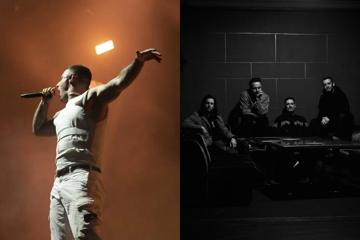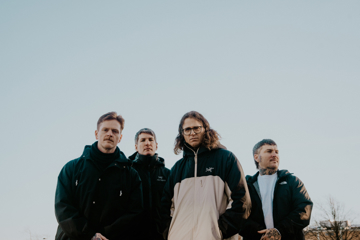Vapour Trail
You come back to earth with a massive bump when you have to deal with labels after that, which are like all the nightmares that you read about
Sometimes it's as hard to recover from blinding success as it is from devastating failure. When Mark Gardener started the band Ride with school friend Andy Bell at the tail end of the '80s they would have had little inkling of the rollercoaster ride ahead of them, the band becoming the pin-up boys of the burgeoning 'shoegaze' genre and one of the leading lights of Alan McGee's Creation Records stable before imploding upon the release of fourth album Tarantula in 1996.
After Ride's acrimonious dissolution Gardener tinkered around in an outfit called The Animalhouse, before they in turn split after one album and the singer-songwriter retreated to France, hoping to extricate himself from the machinations of the industry. But the interest in Ride never abated – if anything it gained traction with time – so when Gardener emerged from his hiatus at the turn of the millennium and started playing solo shows there were plenty of people interested in what he was doing, and phase two of his career began in earnest. In the intervening years he's released one solo album (2005's These Beautiful Ghosts) and a raft of standalone releases, and now he's coming down to Australia with LA underground band Sky Parade as his backing band, covering the whole gamut of Gardener's career as well as celebrating the 20-year anniversary of the release of Ride's sophomore album Going Blank Again.
Most recently Gardener scored the soundtrack to the 2010 documentary Upside Down: The Creation Records Story – quite fitting given the large role that Ride played in the label's narrative – and he enjoyed the challenge of working instrumentally.
“I love it,” Gardener marvels. “When I'm in the studio, I've always had this 'kid in a toy shop' approach in that there's these things all around me that make noises. When I did the Upside Down soundtrack I worked closely with the directors and editors, and when you get them on the phone saying vague things like, 'Make them sound sort of distorted and purple', it's like, 'Right, okay, I think I know where you're going with that'. It's really nice because it's just a way that you can make the weirdest and maddest music without worrying too much about the fact that you've got to go and perform it.
Don't miss a beat with our FREE daily newsletter
“To me McGee's almost like an uncle or something, he feels like family to me. It's a nice person to have in your life and feel a familial bond with, because I was eighteen or nineteen when I first encountered Alan and his bottle of champagne with shampoo in it. That's a hell of a good label guy to have at that age, it's perfect. That's why all those bands and all that music rose and elevated everybody and everything, it was great. I was dealing with labels like Creation and Sire Records in the States – Seymour Stein, I have total respect for that man as well – but sadly after that every label and every deal just seems like a massive anti-climax.
“You come back to earth with a massive bump when you have to deal with labels after that, which are like all the nightmares that you read about. After dealing with all of those dodgy people after those days that's why I ended up going to France for two or three years just to get right away from them all, because it was just a bunch of idiots basically.”
Gardener took those few years off in France to clear his head, a move he still believes was worthwhile in the overall scheme of things.
“It needed a good cleaning! It needed a good wipe!” he laughs. “But it was also just purely because after the Ride days dealing with labels was just disastrous really. And it was also the time when the industry realised that everybody was going to start downloading so the money was going to disappear, and everybody was in meltdown – it was horrible. During the Ride days I had a great friend from art school who moved to France and lived in an old mill that we used to go and party in – from time to time we'd go there and get away for a couple of weeks, but this time I thought, 'Actually I need to get away for a couple of years' – so I went to a place where it feeds me, because I just felt completely drained. I needed to get some soul food back in, and the medieval countryside of France – and the cheese and wine – certainly did the trick.
“Of course after a year or two I went a bit stir crazy there because we were so in the middle of nowhere, and I also started getting my act together and feeling good about the prospect of playing solo shows. From there South By Southwest in America started to try and get me out of my bolthole in France, and from there on I started touring and playing and making records again. I'm back to the land of the living basically. I never really lost music, I just wanted to lose that feeling of the industry that was just so awful – being part of the dreaded machine.”
But even after being dragged through the ringer by the machinations of the industry, Gardener enjoys reminiscing about his band's early-'90s glory days.
“It was really golden, yeah,” he smiles. “Even though it was strange it was basically our normality because we didn't know anything different, but you realise at the time that these are real golden moments and you make the most of it. When you're fifteen or sixteen you have these dreams that you want to achieve in your life, but you never for one minute think you will – my ambition when I was fifteen was to play the New Theatre in Oxford, where I'd seen people like The Damned and The Cult and Big Country and The Cure – that just blew me away playing there a few years later.
“Then you find yourself in the middle of Creation Records, and it was lovely – we were their first charting band and you realise that our album sales are paying for My Bloody Valentine's Loveless record. It was completely ramshackle, but you could see that what you were doing had an effect on the label and other people, it was a great team and the start of the great 'indie era' where we were giving the finger to the major labels. We were all winning in our own way with our own different types of music on our own terms, and it just doesn't really get better than that. It's a great feeling and a great thing to be a part of, but when the bubble bursts and you're not in a band anymore then it's pretty weird – it took a good couple of years just to come back to some form of normality and a life that everyone outside of Creation Records and the music industry had been living.”







